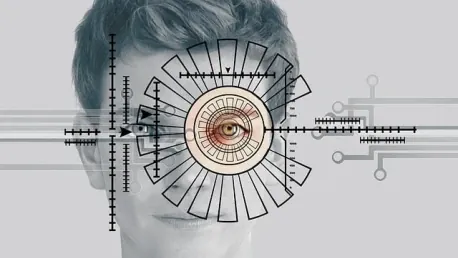In an increasingly digital world, the challenge of distinguishing humans from artificial intelligence has become more pressing. Worldcoin, recently rebranded as World, aims to address this issue through a universal proof of humanity using a biometric identification system based on iris recognition. This ambitious project seeks to create an unforgeable digital identity through iris scanning technology, claiming to have already verified over 10 million users. However, the initiative faces substantial opposition from governments and data protection authorities.
The Rise of AI and the Need for Reliable Online Authentication
As artificial intelligence technology continues to evolve, ensuring the authenticity of online users has become crucial. AI advancements complicate the reliability of online interactions, making it difficult to distinguish between human and machine. Worldcoin’s founders argue that their biometric system can provide a decentralized and secure method of verifying human identity without relying on traditional administrative documents. The core technology utilizes a network of biometric scanners, referred to as orbs, which capture and analyze users’ iris data to generate a unique World ID.
Worldcoin claims that this identification is secure and private, as it avoids centralized data storage, thereby preventing unauthorized access or hacking. The project emerges against the backdrop of rapid AI advancements, highlighting the need for innovative solutions to maintain the integrity of digital interactions. With the increasing sophistication of AI technology, traditional methods of authentication, such as passwords and one-time codes, are no longer sufficient to guarantee the identity of online users. Consequently, the development of a robust and foolproof verification system has become imperative.
Despite its technological prowess, the success of Worldcoin’s system hinges on widespread user adoption and trust. The challenge lies not only in convincing users of the security and benefits of iris-based identification but also in addressing the ethical and privacy concerns that accompany the collection of biometric data. The project’s ultimate aim is to create a universally accepted digital identity system that can seamlessly integrate into various online platforms and services, providing a reliable solution to the growing issue of AI-driven identity fraud.
Privacy and Security Concerns
Despite its claims of enhanced privacy and security, Worldcoin has stirred significant concerns among cybersecurity and data protection experts. The primary apprehension centers around the massive collection of biometric data and the potential risks of misuse and mass surveillance. Critics argue that the large-scale harvesting of such sensitive information could lead to unprecedented privacy violations and create a serious risk of identity theft. The thought of having one’s biometric data compromised or exploited by malicious entities raises alarm bells for many users.
Moreover, the lack of transparency about the storage and management of the biometric data has intensified skepticism. Many experts question how Worldcoin ensures the security of the collected data and whether the measures in place are sufficient to protect users’ privacy. The absence of clear and detailed explanations about data handling processes undermines the confidence of potential users and regulators alike, casting doubts on the project’s ability to safeguard individuals’ sensitive information.
To address these concerns, Worldcoin must implement stringent data protection measures and foster transparency in its operations. This includes detailing how biometric data is anonymized, encrypted, and securely stored, as well as providing users with clear information on their rights and the steps taken to prevent unauthorized access. Building trust is crucial for the widespread acceptance of the system, and this can only be achieved by demonstrating a concrete commitment to privacy and security.
Regulatory Challenges and Global Opposition
As of January 9, 2025, Worldcoin celebrated a milestone of 10 million verified users, positioning this achievement as a pivotal step towards establishing a secure and universal identification system. However, this success hasn’t deterred regulatory bodies from imposing restrictions. For instance, Kenya was the first country to ban Worldcoin in August 2023 due to concerns over national security and data privacy. This measure set a precedent that influenced other nations, prompting a wave of scrutiny and regulatory actions against the project.
Following Kenya’s lead, Spain imposed a three-month suspension on Worldcoin’s activities in March 2024. The Spanish Agency for Data Protection accused the company of illegally collecting biometric data from minors and obstructing users’ right to rescind consent. The ban was extended until the end of the year, reflecting deep-rooted concerns about the project’s impact on privacy. These regulatory actions underscore the significant challenges Worldcoin faces in gaining global acceptance and regulatory approval for its ambitious initiative.
The resistance encountered highlights the complexity of establishing a universal identification system in a landscape characterized by diverse regulatory environments and varying data protection standards. Worldcoin must navigate these challenges by actively engaging with regulators, adapting its practices to comply with local laws, and addressing the specific concerns raised by each jurisdiction. This requires a flexible and adaptive approach to ensure that the project remains viable and compliant with international standards.
Global Repercussions and Further Bans
Other countries followed suit. Portugal enacted a 90-day suspension in response to issues similar to those raised by Spain. In May 2024, Hong Kong also banned Worldcoin, emphasizing risks related to privacy and the fear of pervasive surveillance. South Korea took more stringent action by fining Worldcoin 1.1 billion won (approximately $829,000) in September 2024 for violating data protection laws. These bans and penalties highlight the pervasive unease about Worldcoin’s biometric data practices and illustrate the regulatory hurdles the project faces globally.
Worldcoin’s response to these sanctions has been to reiterate its compliance with local regulations and emphasize its commitment to protecting user data. However, many regulators remain unconvinced, citing a lack of transparency regarding the project’s operations and data security measures. The reluctance of authorities to fully endorse and support the initiative indicates the substantial effort required to demonstrate the safety and reliability of Worldcoin’s system.
To overcome these obstacles, Worldcoin must prioritize building a strong relationship with regulators and transparently addressing their concerns. This involves not only complying with existing data protection laws but also actively participating in discussions about the future of digital identity and biometric data usage. By contributing to the development of robust regulatory frameworks, Worldcoin can position itself as a leader in the responsible and ethical deployment of biometric identification technology.
The Broader Debate on Digital Identification
As our world becomes more digital, the need to tell humans apart from artificial intelligence has become critical. Worldcoin, recently renamed World, is confronting this challenge by introducing a unique biometric identification system focused on iris recognition. This groundbreaking project aims to establish a foolproof digital identity for individuals through iris scanning technology. World claims to have already verified the identities of over 10 million users with this method. Despite its innovative approach, the project encounters significant resistance from governments and data protection authorities concerned about privacy and security issues. They argue that such a vast database of biometric information could be misused or become a target for cyberattacks. Critics also worry about potential surveillance implications and the ethical considerations of collecting and storing such personal data. As World continues to push forward, it must address these concerns to gain broader acceptance and ensure the security and privacy of its users’ biometric data.









